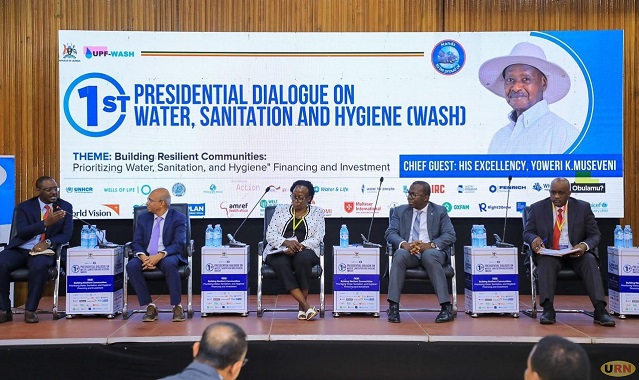
Kampala, Uganda | THE INDEPENDENT | The Ministry of Water and Environment has disclosed that 14,000 out of Uganda’s 70,626 villages still lack access to clean and safe water.
This was revealed by Eng. Dr. Joseph Oriono Eyatu, Commissioner of the Rural Water Supply and Sanitation Department, during the 1st Presidential Dialogue on Water, Sanitation, and Hygiene (WASH) held at Parliament on Friday.
Dr. Eyatu emphasized that equitable access to safe water, sanitation, and hygiene is fundamental for a healthy, productive, and dignified life. He said that yhe government has prioritized increasing access to WASH services through its Vision 2040, the National Development Plan (NDP) III, and the NRM Manifesto.
“Millions of children die prematurely from illnesses related to the lack of WASH services. This is unacceptable, especially as the rural population bears the greatest burden, with WASH-related costs in rural areas amounting to UGX 4,308 billion, twice that of urban areas,” Dr. Eyatu stated.
He further highlighted that WASH-related challenges in rural areas result in an estimated UGX 210 billion annual loss, compared to half of that in urban areas.
Additionally, the cost of inaction—due to poor sanitation and hygiene—leads to an annual loss of USD 177 million, including healthcare costs, lost productivity, and diminished quality of life.
Dr. Henry Mwebesa, Director General of Health Services in the Ministry of Health, echoed the country’s WASH-related challenges. He noted that 75% of Uganda’s disease burden is preventable, with communicable diseases like cholera, dysentery, diarrhea, typhoid, and skin and eye infections closely linked to inadequate water, sanitation, and hygiene.
He pointed out that WASH-related diseases cost the government 530 billion Shillngs annually, exceeding the 511 billion spent on medicines nationwide.
To reduce the disease burden, Dr. Mwebesa urged prioritizing WASH interventions within the national minimum healthcare package.
Although there has been progress in improving sanitation, with 19% of households having proper latrines in 2019, increasing to 44% in 2023, many rural areas remain underserved.
Abim District Woman MP Janet Okori-Moe and Buyende District Woman MP Annet Mary Nakato expressed concern over the breakdown of water sources, forcing women and children to travel long distances for domestic water.
“When we lack water, even the education sector is affected. Teachers arrive late because they wait for their wives who must walk long distances for water,” Okori-Moe noted.
MP Nakato added, “Buyende struggles with water shortages, leading to domestic violence due to long waiting times at broken boreholes that take too long to repair.”
Prime Minister Robinah Nabbanja, representing President Yoweri Museveni, reiterated the government’s commitment to providing safe water to 6,017 villages and extending WASH services to cover 70% of the rural population and 85% in urban areas.
The dialogue, attended by representatives from UNICEF, UNHCR, and civil society organizations, was themed “Building Resilient Communities: Prioritizing Water, Sanitation, and Hygiene Financing and Investment.”
It aimed to prompt a Presidential commitment to WASH across all sectors. Achieving “clean water and sanitation for all” is enshrined in Sustainable Development Goal 6, one of the 17 UN SDGs.
****
URN
 The Independent Uganda: You get the Truth we Pay the Price
The Independent Uganda: You get the Truth we Pay the Price



